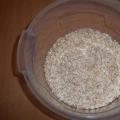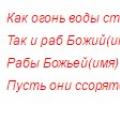The poem was written by Nikolai Rubtsov in 1969. Like many of the author’s poems, this is imbued with love for the Motherland. The poet openly and sincerely declares his feelings for his native land. Nikolai Rubtsov’s poems are always beautiful in their simplicity; you don’t need to have a special gift to understand the meaning of the verse.
The meaning of the poem lies largely in the fact that the native land is dearer than anything in the world, the lyrical hero would not exchange his hut in the azure field for anything. He wandered all over the earth, but there was no refuge anywhere, only in his homeland it was quiet and calm, any storm was of no consequence. The last stanza seems to unite the whole meaning of the poem: everything that is necessary for happiness, happiness itself, lies in the Motherland, which is “under the showers and heat” - which is eternal.
Nikolai Rubtsov sees happiness like no one else, an amazing ability to gather all his feelings in the Fatherland, to love her as tenderly and passionately as a mother. Yesenin had similar feelings; the poet perceived his Motherland as his wife.
In conclusion, all that remains is to say that Nikolai Rubtsov is an amazing poet not only of his time. Using his poems it is very easy to teach children the basics of literature. Simple language and great meaning: recognizing Nikolai Rubtsov will not be difficult.
Analysis of the poem Hello Russia according to plan
You might be interested
- Analysis of the poem Blue Fog. Yesenin's snow expanse
Sincerity, simplicity, and colorfulness distinguish the poetry of S.A. Yesenin. His entire creative path is an understanding of the human soul, of the Russian character. Especially philosophical reflections on the meaning of life, the purpose of man and the inevitability of fate
- Analysis of Barto's poems
Analysis of Barto's works
- Analysis of the poem On the Hills of Georgia by Pushkin 9th grade essay
1829, Alexander Sergeevich Pushkin goes to the Caucasus for the second time, where he writes this wonderful poem. Experts continue to debate to this day:
- Analysis of Tyutchev's poem Gray shadows mixed...
To begin the analysis of the famous poem “The gray shadows mingled...”, authored by Fedor Ivanovich Tyutchev, one must begin with how exactly the poet conceived the idea of creating this poem.
- Analysis of Voznesensky's poem Saga
>>N. Rubtsov. In the evenings. Meeting. Hello Russia
Nikolay Rubtsov
In the evenings
From the bridge there is a road going uphill,
And on the mountain - what sadness! -
The ruins of the cathedral lie.
It's like the old one is sleeping Rus.
Former Rus'! Wasn't it in those years
Our day is like it’s on our chest,
Was nourished by the image of freedom,
Always flashing ahead!
What a joyful life
I burned out and moved away!
And yet I hear from the pass,
How it blows here, how Rus' lived.
Still as fun and powerful
Here the guys get along stirrups,
The evenings are warm and clear.
Just like those old days.
Meeting
How much you have changed! -
I exclaimed. And the friend was taken aback.
And he became sadder than an orphan...
But I, laughing, consoled him:
- Changing the previous features.
Changing age, anger and mercy,
Not only me, not only you,
And all Russia has changed!..
Hello Russia...
Hello, Russia is my homeland!
How joyful I am under your foliage!
And there is no singing, but I hear clearly
Invisible singers singing choral...
It was as if the wind was driving me along it,
All over the earth - in villages and capitals!
I was strong, but the wind was stronger.
And I couldn't stop anywhere.
Hello, Russia is my homeland!
Stronger than storms, stronger than any will
Love for your barns by the stubble,
Love for you, hut in the azure field.
I won't give up the mansion for her
Your low house with nettles under the window...
How peaceful it is in my upper room
In the evenings; the sun was setting!
Like all space, heavenly and earthly.
I breathed happiness and peace through the window,
And the glorious air of antiquity emanated,
And he rejoiced under the showers and heat!..
Be careful with the word...
1. Three poems Nikolai Rubtsov... About the past of Russia, about changes, about the poet’s love for the Motherland... What does Rubtsov say about the past of Russia? The author writes about the history of the life of a people, a country - it rejoiced, grieved, and moved away. What is hidden behind these simple words?
2. How is the poet’s love for the Motherland expressed? What pictures of the world around him will remain in his heart and warm his soul? What literary techniques and means does the author use to express his feelings?
3. Read aloud or memorize one of the poems.
Literature, 8th grade. Textbook for general education institutions. At 2 o'clock/automatic state. V. Ya. Korovin, 8th ed. - M.: Education, 2009. - 399 p. + 399 pp.: ill.
“Hello, Russia” Nikolay Rubtsov
Hello, Russia is my homeland!
How joyful I am under your foliage!
And there is no singing, but I hear clearly
The choral singing of invisible singers...It was as if the wind was driving me along it,
All over the earth - in villages and capitals!
I was strong, but the wind was stronger
And I couldn't stop anywhere.Hello, Russia is my homeland!
Stronger than storms, stronger than any will
Love for your barns by the stubble,
Love for you, hut in the azure field.I won’t give up all the mansions
Your own low house with nettles under the window.
How peaceful it is in my upper room
The sun was setting in the evenings!Like all the space, heavenly and earthly,
I breathed happiness and peace through the window,
And the glorious air of antiquity emanated,
And he rejoiced under the showers and heat!..
Analysis of Rubtsov’s poem “Hello, Russia”
Fate decreed that Nikolai Rubtsov, an orphanage resident, ended up serving in the Northern Fleet, and spent 4 long years on the destroyer “Ostry”. The return from the army coincided not only with the poet’s 24th birthday, but also with the beginning of his creative career. It was during this period that Rubtsov's poems began to appear regularly in Leningrad newspapers. Among them, the work “Hello, Russia” was published, written in 1960, dedicated to the return to the mainland.
For 4 years, life in the country has practically not changed, but the author is surprised to notice how prettier the cities have become, and realizes that he has been left out of life for a long time. The return turns out to be so joyful and intoxicating that the poet cannot contain his delight. The singing of birds and the rustling of green leaves, which Rubtsov missed so much, give him great pleasure. Only now is the young poet beginning to realize that his homeland for him is not just 6 letters composed in a certain order. This word includes a whole world, huge and bright, which the author missed so much. “It was as if the wind was driving me across it, across the whole earth - through villages and capitals!” notes Rubtsov, emphasizing that in the everyday bustle he did not notice all the beauty of Russia. He had neither the time, nor the strength, nor the desire to stop and look around. However, now the period of rethinking spiritual values and priorities has come, so the poet openly declares: “For all the mansions I will not give up my low house with nettles under the window...”. He does not need fame and wealth, since they are perishable. But an amazing feeling of peace of mind and tranquility cannot be bought for any money. And how can the striking beauty of overseas countries compare with a simple room in a country house, which in the evenings is illuminated by the soft rays of the setting sun? Nikolai Rubtsov believes not. And she is not ashamed of her feelings, although to some they may seem too pretentious and inappropriate, not worthy of being flaunted.
The author is not ashamed of his poverty, because he has the main wealth - the open space of the earth, which “smells of antiquity and rejoices under the downpours and heat.” The fragile world in which the author lives is not illusory, but quite tangible, and at the same time very harmonious. This is Rubtsov’s homeland, which, although devoid of secular gloss, is still able to give shelter to a tired traveler, console him and cheer him up, and also give him confidence in the future.
In general, it was at the turn of the 50s and 60s, when the dissident movement was being formed in the USSR, that such poems were not in fashion. According to many critics, they smelled of falsehood and pretense a mile away. However, Nikolai Rubtsov is sincere in his words, and this is felt both in every line and in a simple address: “Hello, Russia is my homeland!” In order to realize how important sunsets and nightingale trills, morning coolness and evening dew are for him, the poet had to experience separation from everything that was truly dear to him. He did not attach importance to such trifles until he felt an acute lack of them in his nomadic life. It was this fact that made Rubtsov change his attitude towards the country in which he was born and raised. The poet did not become a dissident only because he felt from his own experience the truth of the statement that one does not choose one’s homeland. This means you need to love her for who she is, trying to see only the good in everything. These simple truths helped Rubtsov that you can love a simple “hut in an azure field” and at the same time be a truly happy person who knows the value of simple human joys.




